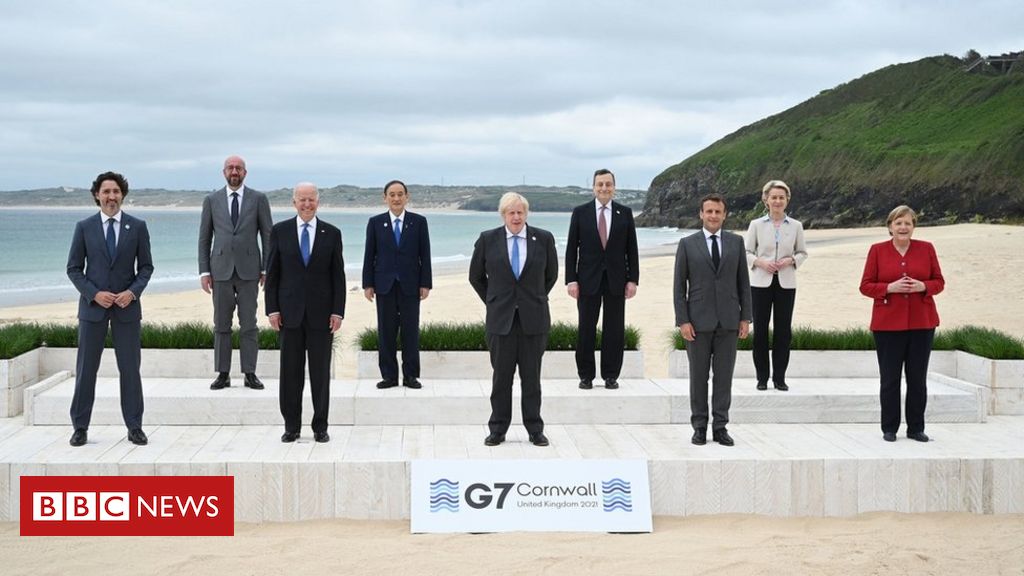G7 summit: Spending plan to rival China adopted
G7 summit: Spending plan to rival China adopted Published 2 days ago
image copyright Leon Neal/PA Media
G7 leaders seeking to rival China have adopted a plan to support lower- and middle-income countries in building better infrastructure.
President Joe Biden said he wanted the US-backed Build Back Better World (B3W) plan to be a higher-quality alternative to a similar Chinese programme.
China’s Belt and Road Initiative (BRI) has helped finance trains, roads, and ports in many countries.
But it has been criticised for saddling some with debt.
In a statement at their summit in the English county of Cornwall, the G7 leaders said they would offer a “values-driven, high-standard and transparent” partnership.
However, details of how the G7 plan will be financed remain unclear. German Chancellor Angela Merkel said the group was not yet at a stage to release financing for its initiative.
The US has been particularly critical of China’s so-called “debt diplomacy”.
The G7, the world’s seven wealthiest democracies, have also committed to a new plan to stop future pandemics.
The measures include cutting the time needed to develop and license vaccines and treatments for Covid-19 to under 100 days. The plan will be officially unveiled on Sunday, alongside the final summit communique.
UK Prime Minister Boris Johnson is hosting the three-day gathering at the seaside resort of Carbis Bay.
A US plan to counter China
The Americans see Saturday’s session at the G7 as being about challenging the rise of Chinese influence around the world. Beijing’s Belt-and-Road initiative, which has seen billions of dollars poured into developing countries, must be countered by the Western democracies.
Senior administration officials want to prove that Western values can prevail. They argue that Chinese investment has come with too high a price tag; that the forced labour of the Uyghur minority in Xinjiang is morally egregious, and economically unacceptable as it prevents fair competition.
Global supply chains, Joe Biden will insist, must be free of this kind of labour. US officials say this is not just about confronting China, but about presenting a positive alternative for the world.
But the Biden administration has been vague about how much the West would contribute to this global infrastructure plan and over what timescale. What is clear is a renewed determination among Western powers that they need to act now to counter a resurgent and increasingly powerful China.
media caption What China’s One Belt, One Road really means
What have Western powers done about China so far?
Earlier this year, the US, the European Union, the UK and Canada introduced co-ordinated sanctions on China.
The sanctions, including travel bans and asset freezes, targeted senior officials in Xinjiang who have been accused of serious human rights violations against Uyghur Muslims.
More than a million Uyghurs and other minorities are estimated to have been detained in camps in the north-western province.
The Chinese government has been accused of carrying out forced sterilisations on Uyghur women and separating children from their families.
image copyright Reuters image caption China has created a sprawling network of detention camps for minorities in the Xinjiang region
A BBC investigation published in February contained first-hand testimony of systematic rape, sexual abuse and torture of detainees.
China responded with its own sanctions on European officials.
What is the G7’s Covid plan?
The leaders will issue the Carbis Bay Declaration on Saturday. Its aim is to prevent any repeat of the human and economic devastation wreaked by Covid-19.
Globally, more than 175 million people have had the infection since the outbreak began, with over 3.7 million Covid-related deaths, according to America’s Johns Hopkins university.
The G7 declaration will spell out a series of steps, including:
Slashing the time taken to develop and licence vaccines, treatments and diagnostics for any future disease to under 100 days
Reinforcing global surveillance networks and genomic sequencing capacity
Support for reforming and strengthening the World Health Organization (WHO)
The declaration is expected to incorporate recommendations from a report by a group of international experts drawn from across industry, government and scientific institutions.
UN Secretary General António Guterres and WHO director Dr Tedros Ghebreyesus will also take part in Saturday’s session.













